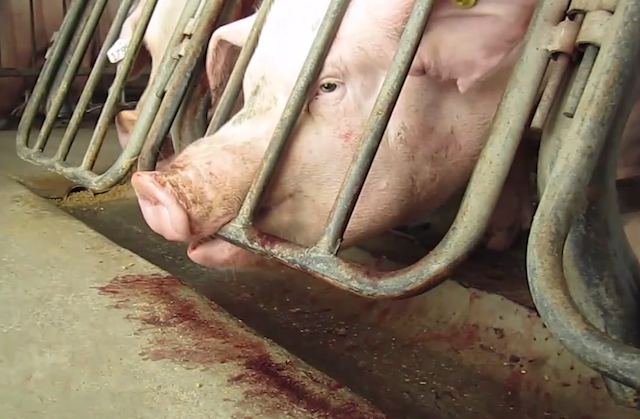It’s difficult to believe that in 2012 we live in a society that allows despicably inhumane, all-out barbaric practices against farm animals. And even worse still, we have companies that can get away with falsely labeling its products in such a way that leads the public to believe that these products are “natural,” “artisan” or “nutritional.”
I don’t know about you, but I can’t seem to wrap my head around the fact that the government deems meat and poultry that was once a living creature shot up with antibiotics because its beak was sawed off, or its utter lacerated from the constant friction of a mechanical milking contrivance, “safe” and “nutritious.” Not to mention all the hormones these animals are injected with so that they grow faster and produce higher quantities of milk.
This type of agribusiness is referred to as “factory farming,” and it implies just that. Livestock are raised in confinement at high stocking density and the farm operates as a factory. In the U.S., factory farming now accounts for more than 99 percent of all farmed animals raised and slaughtered.
Recent public outcries over confining pigs to genstation crates, a 2 x 7 foot enclosure barely larger than the sows’ own bodies, has sent shockwaves through the pork industry. Many large fast food chains have agreed to move away from the use of gestation crates, but Domino’s just doesn’t seem to find it that important.
“Over the past six months, an avalanche of announcements by businesses including Burger King, McDonald’s,Wendy’s, Denny’s, Carl’s Jr., Safeway, and Hormel (the maker of Spam), have all expressed the intention to move away from gestation crates. Even Smithfield Foods “” the nation’s largest pork producer “” has agreed to phase out the crates by 2017. Eight states have also banned the practice, including Michigan, home to the Domino’s headquarters. (The chain’s top supplier is Tyson Foods, a company that has shown no interest in following the trend away from crates “” and has even recently been in the news for continuing to embrace the practice.)” (Grist)
The most ironic part of the company’s refusal is that it’s been trying to play the “artisan” card, which to most implies a wholesome local product that does not encourage mass production of meat, nor the inhumane treatment of animals in which the meat came from. And just in case you’re wondering how Domino’s responded to criticisms against its new fancy label, here’s the company’s pathetic response:
“We don’t wear black berets, cook with wood-fired ovens or apprentice with the masters in Italy. Though we may not be artisans in the traditional sense, inside this box you’ll find a handmade pizza crafted with the kind of passion and integrity that just might convince you we are. Which is why every single Domino’s Artisan Pizza we make comes signed by the person responsible for it. A signature that lets you know it’s time to expect more from your local Domino’s.” (The Huffington Post)
While banning the use of gestational crates will not solve all problems associated with the factory faming of pigs, it’s certainly a huge step in the right direction.
For a glimpse of the conditions these animals endure in gestation crate confinement, view the video (documented by an investigator from The Humane Society of the United States) below.
[youtube L_vqIGTKuQE]




